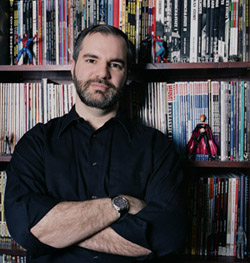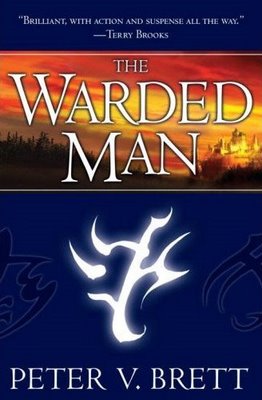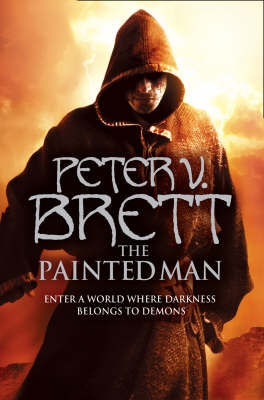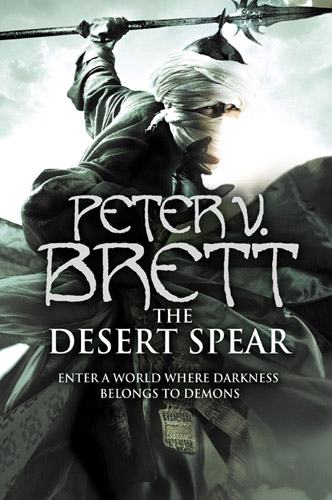 Since his debut novel, The Painted Man (called The Warded Man in North America) was released late last year, Peter V. Brett has been making quite a name for himself. Considered by many to be the best Fantasy debut since Patrick Rothfuss’ The Name of the Wind and right up alongside other debut’s such as Scott Lynch’s The Lies of Locke Lamora and Joe Abercrombie’s The Blade Itself, Brett’s first novel has a lot to live up to.
Since his debut novel, The Painted Man (called The Warded Man in North America) was released late last year, Peter V. Brett has been making quite a name for himself. Considered by many to be the best Fantasy debut since Patrick Rothfuss’ The Name of the Wind and right up alongside other debut’s such as Scott Lynch’s The Lies of Locke Lamora and Joe Abercrombie’s The Blade Itself, Brett’s first novel has a lot to live up to.
Peter and I cover a lot of things in the interview, including the fact that a large part of The Painted Man was written on his PDA, why it’s okay for an unpublished author to tackle a trilogy, how life has changed since becoming a full time writer and why he’s not writing 900,000 words a year.
But you don’t want to hear that from me, right? Hear it from the man himself, instead.
The Interview
Peter, welcome to A Dribble of Ink! To start things off, why don’t you tell us something that we don’t know about Peter V. Brett.
I had really long hair and wore heavy metal t-shirts in high school.
Now how about something we don’t know about The Painted/Warded Man
The first draft had a totally different (and in my opinion, shit) ending about building warded roads, and didn’t introduce Rojer and Leesha until they were adults. In retrospect, it’s no wonder why no one wanted to buy or represent that draft.
Sounds like the novel went through some pretty drastic changes throughout its life. What’s your policy on outlining?
I’m a big believer in outlining. It was a lesson I learned the hard way on previous (unpublished) novels. Some writers can just make up a story as they go along, but I think they are few and far between, and with a only couple of exceptions, it really shows in their work.
But that said, outlines are not written in stone. New ideas and inspirations come, and only a fool sticks to an outline once they have thought of something better. The key is to REVISE your outline, top to bottom, to incorporate the new ideas, rather than just go off-road without a map.
Any specific examples of how your story or your characters surprised you?
It happens all the time. As I write about characters and get to know their personalities better, I frequently reach places in the outline where they are expected to say or do something that they stubbornly refuse to do because it’s not in their nature. There are also 3rd tier characters like Abban the khaffit, Bruna the Herb Gatherer or Leesha’s mother Elona who unexpectedly steal every scene they’re in. These things can play havoc with the outline, but I tend to think of them more as evidence that I’m doing something right rather than something wrong. Good characters and story take on a life of their own.

What was it like the first time you autographed a copy of your first published novel?
Oh, man. I remember it like it was yesterday. Mainly because it practically was. I was hanging out with my old roommate Cobie, who I used to play Dungeons and Dragons with in college. He was just randomly in town at the time (he is a jet-setting hotshot surgeon these days), when the box of hardcovers arrived from Voyager. I wasn’t even expecting it, as they sent them as something of a surprise.
If you go back and read my High School yearbook quote, it states my ambition as “To become a published novelist.” So holding those books almost twenty years later was a deeply significant moment for me, and it was amazingly fortunate that I just happened to be with a friend who has known me most of that time and knows and shares my deep and abiding love of fantasy and fantasy novels. We just kind of flipped quietly through the pages for a while.
“Can I get the first copy?” he asked.
“Dude. Of course,” I said.
“You’ll have to sign it,” he said, producing a pen from his jacket pocket.
“No, wait!” I shouted. “My mom gave me signing pens for my birthday!”
Which was true. I ran to my desk to try and find them, and signed his book with the same set of pens that I’ve used on every book since. It was a surreal moment, but not nearly so much as the first time someone I didn’t know wanted an autograph.
Your first novel is titled The Warded Man in North America and The Painted Man through the rest of the world. The Painted Man is clearly a way cooler title. Why the name change?
The Painted Man was my original title. Del Rey books, who were the first to purchase the manuscript, felt the title wouldn’t play well with American audiences. I sent them a large list of alternate titles, but they had not made a final decision by the time Voyager in the UK was ready to go into production. My editor at Voyager asked if it would be all right to use my original title, and I agreed happily, as I had always liked it best.
Having the title change between markets was a little frustrating, mainly because I was afraid that any positive buzz from one market wouldn’t carry as easily to the other, and that some person might buy both versions thinking they were two different books. Neither seems to have turned out to be the case, though. Perhaps because I have been very diligent on the web about using both names and pointing out that they are the same book.
What did you learn from writing The Painted Man that helped make The Desert Spear a better novel?
That the key to writing for me is getting into the POV characters’ heads, and the best way to do that is to take the reader through the events in their life that define their point of view on the world. I don’t think I can ever again write a novel from a single point of view, or worse, in the first person. I get bored, or distracted. For me, the magic happens in the ensemble and how they interact.
Peter, there’s one niggling question that’s always that always bothers me when I’m browsing the shelves at a bookstore and see the first volume in a new trilogy (hopefully, if not longer) from a debut author. Isn’t it a bit of a risk for someone hoping to break in to the industry to start off by trying to sell 1/3 of a story? When you first pulled out your Blackberry (which we’ll get back to later), why’d you chose the trilogy floating around your head and not a (theoretically) safer stand alone novel?
Well, it’s kind of a risk just writing that first novel at all. Writing a full-sized novel of any sort is a tremendous investment of time, effort, and creative energy for the one-in-a-thousand chance that ANYone will publish it, much less a major house. Of course some thought to what is sellable is advisable when starting out, but I think you also have to write what feels right to you. What you love. I grew up reading multi-novel epic fantasies, and that was always what I wanted to write. It never occurred to me to try and do anything else.
That said, however, I think The Painted Man (AKA The Warded Man) does stand alone pretty well. It has a clear story arc with a beginning, middle, and end, as does the sequel, and hopefully all the books to come. The bit at the very end is kind of a teaser for the next book more than a cliffhanger, and I don’t think it creates any unexplained questions for the reader with regards to the main narrative.
I think of The Painted Man as a whole story within a larger story. The Desert Spear will have some different protagonists, and tell their whole stories with a beginning, middle, and end, while also continuing that larger story.
In a recent interview with Dark Wolf’s Fantasy Reviews you mention that, although you have signed a three book deal, your plans are for a five book story arc. How does this sort of uncertainty affect the way you approach writing the follow-up novels to The Painted/Warded Man?
I wouldn’t use the word “uncertainty”. The Desert Spear was plotted before I ever even tried to sell The Painted Man, and I am sticking to that plot quite closely. I also know the main plot of the last book in the series. I could make that book 3 if I really wanted, but I think it would do the characters, world, and story something of a disservice. I have no intention of creating a 10+ book series like Robert Jordan or Terry Goodkind, but my setting has a lot of avenues and characters I want to explore. I think if I closed the series in three books, the ending would feel rushed, and readers would miss out on a lot of stories I have to tell.
I have a rough outline planned for book three, which will be titled The Daylight War, and will focus further on humanity’s tendency to fight amongst ourselves even when demons are clawing at the door. I have many, many pages of notes for what comes next, but I haven’t yet arranged them into the final story arcs.

What’s one problem with Epic Fantasy today and how does The Painted/Warded Man solve it?
I don’t know that there is a ‘problem’ with Epic Fantasy at all. As with any medium or genre, there are creators who are good at it and creators who aren’t. I think there are risks, though, that even the best authors need to be wary of. One of those is having the story and world grow so large in the telling that it is impossible to have real progress or closure in individual books. This leads to endings that are unsatisfying, and I think it violates the contract between author and reader. When you read a 500+ page book, you want at least some kind of resolution at the end, especially if you are expected to wait a year or more for the next one in the series. This is something every Epic Fantasy author, myself included, needs to watch out for as their series progresses.
As for how The Painted Man/Warded Man solves this, it is as I said above. The book has a beginning, middle, and end for all it’s POV characters. They had adventures, grew as people, and in the end resolved at least some of their pressing problems.
Many people around the ‘net are calling The Painted/Warded Man the best debut since Patrick Rothfuss’ much lauded The Name of the Wind. As a new author, how do you deal with that kind of attention without letting it inflate your ego?
It’s true that I have been fortunate enough to get some really positive early reviews, but in all honesty, I think it has the opposite effect. I find all the attention rather humbling. The more people enjoy the first book, the greater the pressure I feel to deliver something equally good (dare I hope better?) with the sequel, which creates no end of neurosis and anxiety. I think a lot of authors feel this way. You’re only as good as your last book, and it’s always easier to work when no one is looking over your shoulder.
Besides, there’s a baby in the house who doesn’t give a damn about my ego. It’s hard to keep a swelled head when you’re changing a diaper at 4am.
How has your life changed most since becoming a published author?
Massively. My contract commitments for the sequels made it impossible for me to maintain a day job, so I have been writing full time for over a year. It has been amazing, especially since my daughter, Cassandra, was born this past summer, right before The Painted Man was published. I feel very fortunate that writing full time allows me to be home with her during the day and see a lot of parts of her development that other fathers miss.
What aspect of life has stayed alarmingly the same since signing that book deal?
The constant second-guessing and uncertainty about my writing. Even when there are agents and publishers and editors involved in your work, at the end of the day, writing is still a solitary endeavor, and you always wonder if your stories will speak to others the way they do to you. There’s nothing for it but to press on ahead, though. Do the best job you can, and refuse to hand in anything that doesn’t satisfy you, even if it means seemingly endless rewriting.
How does one transition from being a hobbyist writer, as so many of us are, to being a full time writer with the pressure of a deadline? After spending so much time writing on your commute to work (a well defined routine forced upon you), has it been hard to adjust your writing habits?
It has, and this is something I discuss in detail on my blog. There are a lot of aspects to writing professionally that you don’t think of when it’s a hobby, but when it also becomes how you feed your family, there is considerable paperwork and duty above and beyond the actual writing. I made a lot of naïve assumptions about how long it would take me to finish The Desert Spear once I was writing “full time”, and had to accept some harsh realities. Luckily, I had a good head start before the first book published, so readers shouldn’t notice how the sequel took me twice as long to write as I first estimated. Hopefully I can be more realistic when I estimate a date for the third book.
Much has been made of the fact that you wrote a good portion of your novel on a Blackberry mobile device. Now that you’ve made the shift to being a full-time writer you probably have a more traditional writing process. What’s your typical work day like now?
Well, for the record, it wasn’t a Blackberry, but an HP iPaq smartphone that ran MSWord mobile. The book never would have gotten finished without that.
It’s funny, but sometimes I think my muse lives in that phone (she’s moved to the newer model I have now). I do most of my writing at home on a desktop now, but I still write faster and break through blocks better on the phone than I do at my full computer. I think it’s because there are fewer distractions. In my library, where I do most of my writing, I am surrounded by toys and comics and books and music. I have high-speed internet access and a drawer full of goodies. I can get up and wander to the fridge or the bathroom or to check on the baby.
When I’m riding the subway or sitting in a coffee shop or the park and working on my phone, there is nothing but the tiny screen, and I can fall into that world more fully than anywhere else.
But it’s winter in NYC right now and I have no more commute, so venturing out and writing on the phone is less common. Lately I spend my normal business hours working on my blog and website, doing paperwork, writing interviews, and the like, because the baby makes the uninterrupted stream of thought I need to write prose almost impossible. When she goes to bed around 9-10pm, I start writing in earnest, usually working till around 3-4am. It’s a brutal schedule, but you do what you have to.

You mentioned earlier that you have no intentions of writing a seemingly endless series like Terry Goodkind and Robert Jordan. Given the choice, as a reader and the quality being even, would you take a tight 300 page stand-alone or a sprawling multi-volume series?
Both. I am a firm believer that books should always have a beginning, middle and end, so they can be enjoyed by themselves as well as part of a whole. But if I really enjoy a story, I like to have the option to revisit the world and spend some time with my friends there. A quick glance at my bookshelves agrees with me, as there are far more series books than standalones, even though I sometimes stop if the first book doesn’t do it for me.
What’s one question you wish interviewers would ask you?
I don’t know anything specific, but I enjoy questions about writing as a craft. I think serious writers are always looking to improve, and questions about point of view, storytelling style, etc. can often help us think through problems and come up with solutions for ourselves as well as others.
About craft, you’ve mentioned in the past that the reason The Painted/Warded Man features several different POV (point of view) characters is that you would get bored if you were forced to write through the eyes of only one character. While writing The Painted/Warded Man did you have to struggle with any particular POV characters who threatened to take over control of the narrative?
Sure. Leesha, mostly. Her sections in the final draft are about twice as long as I had intended them to be in the outline. She really came alive and took over her story arcs. Like with Arlen, I had to leave large gaps in her life to be filled in later I order to keep the story progressing in an orderly fashion. Some of those gaps will be filled in by future novels, and others by short stories like the backup to the deluxe version of The Painted Man that Voyager is putting out later this year. It will contain a 14,000 word novelette about Arlen’s “lost years”.
Is this also true of you as a reader?
Generally, yes. Single POV stories are not my first choice, though there are certainly exceptions, like Naomi Novik’s Temeraire books, or even Harry Potter.
What kind of impact did your editor have on The Painted/Warded Man?
My editor was very passionate about the story, but came to it with the benefit of a cold eye and some distance, which is difficult for many writers. Writers read the same scenes over and over while we work on them, often to the point where we are emotionally attached to bad scenes and the best ones bore us to death. When you’ve been working on a book nonstop for months or years it becomes difficult to tell good from bad. I would say the book benefited more from what she suggested we cut than from what little she suggested I add.
Not to keep hawking my website, but I have a section there called Excisions (http://www.petervbrett.com/excisions/) where I show all those cut scenes, and give an inside view into some of the debates that brought them about.
I would also point out that the book benefitted just as much from the editorial comments of my agent and the friends and family that served as test readers of the early drafts. I am extremely lucky to have all of them as a resource to draw upon.
Thanks taking the time for this interview, Peter. Any final words?
It was a pleasure.
Leave George alone!

[…] wanted to throw up a quickie to note that I have a new interview posted on Aidan Moher’s blog A Dribble of Ink. Unlike most interviews, where I am sent a list of questions, answer them, and that’s it, […]
Great interview! I can’t wait to read this one. If only my copy would cross the ocean already!
Very good interview. I like how it was a series of send/responses there, as it allowed for more interplay there. Strange to think how there are quite a few authors around my age or even younger being published these days, as I used to think successful authors didn’t emerge until their 40s or later.
Thanks for the interview, Aidan. Good stuff. And interesting answers from Peter.
I just have to say this is one of the best interviews I’ve read in a long time. After the flap about Pat’s interview with Glen Cook and his over reliance on a canned questionnaire, this really exemplifies what an author interview should be.
You mentioned you were conducting this interview a while back so I’ve been looking forward to it for a few days and it didn’t disappoint.
Peter seems like a really humble and genuine person, I really enjoy the story he told of signing his first novel for a friend. Also great information about his creative process. I’d never heard he wrote the majority of The Painted Man on his phone that’s pretty impressive especially considering my fat fingers could never get texting down.
Keep up the great interviews, I started following your site regularly after your David Anthony Durham Interview and will continue to do so.
Thanks for the good interview. I will get my copy of The Painted Man in 2009.Can#t await to read it.
Yes, great interview, Aidan! I second Larry’s comment about the increased amount of interplay between interviewer and interviewee — the opportunity you had to ask follow-up questions definitely made the whole thing more engaging. I’m curious as to how you conducted it — email? IM?
Thanks for the kind words. I don’t do many interviews, but when I do I like to make them count by putting my full effort into them.
This interview was conducted via email over the course of several weeks. A slow burn, but one that helped the interview, I think.
What a facinating blog. I’ve bookmarked it and added your feed to my RSS Reader